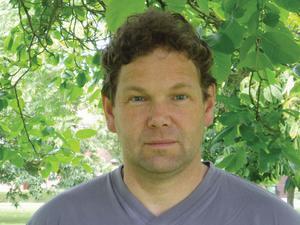Dave Hampton is on a mission to reduce our carbon footprints. He took time out to tell Andy Pearson why individuals, not companies, hold the key to his success. In association with Ferroli.
“Over the years, it dawned on me that the only way I was having meaningful influence on projects was when I was able to influence individuals,” says Dave Hampton. This realisation led him to leave the job he describes as “near-perfect” and set up The Carbon Coach, a business with a mission to coach influential individuals to help them reduce their lifestyle carbon footprint – the tonnage of CO2 emissions produced by their household’s travel and energy.
Fresh from winning the inaugural ‘sustainability leadership’ award from �ǿմ�ý magazine, it’s a move that seems to be working well for him.
“I aim to rapidly raise people’s awareness of their direct carbon impact on the environment,” Hampton explains. “The people I coach actively want to change, but are busy and don’t know where to start. I usually arrange to meet them at their home, and quickly assess their carbon footprint from energy bills, travel data and a few simple questions. Then we’ll discuss the ways they have considered reducing it – at this initial stage it is ‘broad-brush’ stuff.” And, he stresses, it’s confidential. “In a sense, it’s doing the dirty washing in private.”
It seems that there are plenty of chief executives, company directors, politicians, celebs and the like who want to know their carbon footprint (Hampton also provides the service for businesses or employees). “I have a hunch that when individuals commit to making a difference in their home lifestyle, and experience the satisfaction of shedding a tonne or two first hand, they go on to positively influence their corporate situation. If the leader of a team is serious about getting a sustainable project, it’s going to happen,” he explains.
Hampton has steadily built up his green credentials throughout his career. After studying engineering at Cambridge, he worked for British Gas, WS Atkins, BRE (where he headed the BREEAM team until 1997) and ABS consulting, where he became director – a role he obviously enjoyed. “I usually move on after seven years, except at ABS, where I enjoyed eight good years. Leaving was a big wrench, but I felt sure it was right – for me and ABS.”
He is chair of the Construction Industry Council’s Sustainable Development Committee and a member of the Sustainability Forum, an advisory group to the Strategic Forum for Construction. But, despite his obvious passion for sustainability, Hampton is pragmatic.
When individuals commit, they go on to influence their corporate situation
“Wherever you start is ok,” he says. “After all, most of us are living in ignorance of the size of our carbon footprint. The average for each of us in the UK is just over 10 tonnes per year (total UK tonnes divided by population). I tend to focus mainly on home energy and home travel. This bit averages around five tonnes per person every year – about 50% of the total footprint.”
However, Hampton points out that a captain of industry’s lifestyle is such that a footprint of 60 tonnes is common. Outcomes of coaching can be as simple as a change of car or switching to a green electricity tariff. “But changes happen,” he says. “Part of what I bring is urgency.”
Such changes have obviously been implimented in Hampton’s house first, although he claims he didn’t take his personal impact on the environment anywhere near seriously enough until about five years ago. “Now, my house has a solar panel (thermal and PV, so totally autonomous), a light-pipe, super-insulation, whole-house MVHR ventilation, passive-solar conservatory and a wood-burning stove. My family of six, in a five-bedroom house, has a combined carbon footprint of nine tonnes – including our two cars and all holiday travel.” That’s just 1.5 tonnes each.
So, what about building services engineers – are they clients? “They can easily do their own carbon coaching – they understand the issues, it’s second nature to them,” observes Hampton. “I’ll happily help coach them to coach others, but my time is better spent on those that don’t have any grasp on carbon. It’s a huge opportunity. Basically, by 2050 every UK citizen needs to have slimmed down from five tonnes a year to around one tonne – or we’re stuffed. So we need a lot of coaches, and a lot of coaching.
Source
�ǿմ�ý Sustainable Design
Postscript
The Carbon Coach publishes a free newsletter – to sign up, go to www.carboncoach.com


















No comments yet